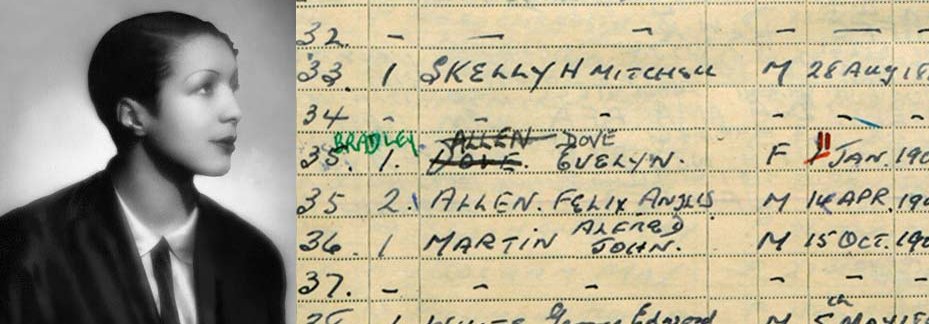A middle-class Londoner
Evelyn was born in London on 11 January 1902 to Francis Dove, a barrister from Sierra Leone, and a white British mother named Augusta.
References to Evelyn appear in a number of places at The National Archives. Evelyn, along with her mother and brother Frank, is listed in 1910 among the passengers on the ship Zungeru, which she disembarked at Plymouth in September of that year. It is likely that they were visiting her father, who spent much of his life working in Ghana.
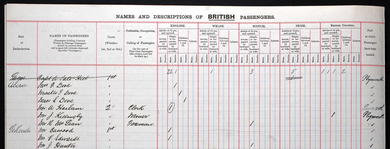
Passenger list for the SS Zungeru showing Evelyn Dove, her mother and brother. Catalogue reference: BT 26/423/33
She then appears with her mother on the 1911 Census, living at 25a Barnard Road, Battersea, South London. This census entry also includes a servant, which attests to the Dove family’s middle-class background – something that wasn’t entirely unusual among Britain’s Black Edwardian population. The composer Samuel Coleridge-Taylor, the son of a Sierra Leonean doctor and white British mother, provides one of the best-known examples.
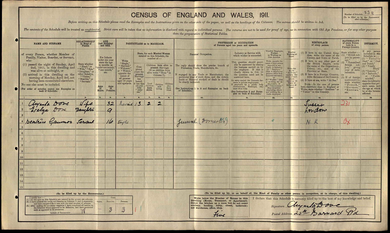
Evelyn Dove’s 1911 Census record. Catalogue reference: RG 14/238/2233
Flair for performance
Evelyn trained at the Royal Academy of Music as a contralto (the lowest female voice type, whereas soprano is the highest) and had aspirations to become an opera singer. However – possibly after experiencing prejudice – she found the world of jazz and cabaret more accommodating.
By 1921, she was performing in The Southern Syncopated Orchestra, a band largely comprised of Caribbean, West African and African American performers.
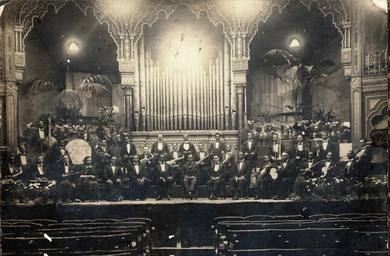
Photograph of the Southern Syncopated Orchestra at a London venue around 1920. Image: Wikipedia
That year a ship Evelyn was travelling on, SS Rowan, sank on its way to Ireland. Thirty-five people – including nine members of the orchestra – tragically lost their lives, after two ships collided with the Rowan in heavy fog. There was time after the first collision for many passengers to don lifejackets and board lifeboats, but the second, from a vessel actually trying to help, caused the Rowan to sink within two minutes.
The National Archives’ guide to Merchant Navy ships wrecked or sunk provides advice on how to find records of shipwrecks and sinkings like this one. Such records rarely account for the toll such events may take on the survivors, however. Given the circumstances, it is unsurprising that The Southern Syncopated Orchestra disbanded not long after their tour of Ireland finished. On top of dealing with the trauma, Evelyn will have had to have found new work.
Having married Milton Alphonso Luke in 1919, she appears in the 1921 Census as Evelyn Augusta Luke, with her Occupation listed as simply 'Independent':
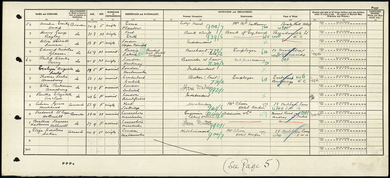
Evelyn Dove’s 1921 Census record. Catalogue reference: RG 15/02341
Evelyn’s star rose and performances took her to many places, both in Europe and beyond. She wowed crowds in America, where she performed in New York at the legendary Connie’s Inn. She dazzled audiences in Europe, including at The Casino de Paris, where she succeeded Josephine Baker. She even went as far as The Harbour Bar at the Taj Mahal Palace, Mumbai.
Some of these performances were problematic, however. Despite Evelyn’s remarkable talent, there was a distinct pressure for Black entertainers to act out stereotypical roles for white audiences. The titles of some of the productions that Evelyn was involved in, for instance, 'Chocolate Kiddies,' speak volumes about these racial tropes. The name of her own song and dance troupe, 'Evelyn Dove and Her Plantation Creoles,' was particularly strange for somebody who grew up in Battersea.
‘Serenade in Sepia’
The outbreak of the Second World War meant a change of focus for Evelyn, and although her entry on the 1939 Register lists her as a ‘travelling variety artiste’, much of this travelling was now done within the UK music hall circuit.
Evelyn also found work on BBC radio, appearing in numerous productions. In 1939, she was given her own music series, ‘Sweet and Lovely’. She co-hosted ‘Rhapsody in Black’ with African American singer Elisabeth Welch in 1940, before hosting ‘Serenade in Sepia’ with Trinidadian folk singer Edric Connor in 1945. ‘Serenade’ ran for 45 weeks, proving so popular that it was aired on television.
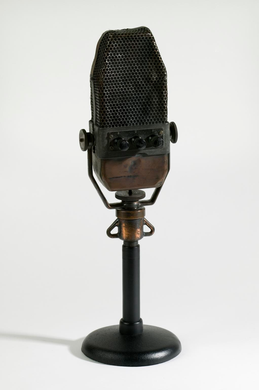
BBC ribbon microphone from around 1945, © The Board of Trustees of the Science Museum (CC BY-NC-SA 4.0)
Unheralded to honoured
Dove passed away in 1987. Despite her fame during the height of her career, she was little-known at the time of her death, and not commemorated in any obituary columns.
Her trailblazing contributions to music, and legacy, have since been expertly documented by the historian Stephen Bourne, who in 2016 wrote the biography Evelyn Dove: Britain’s Black Cabaret Queen. In 2019 Evelyn also featured as a Google Doodle on the 117th anniversary of her birth.
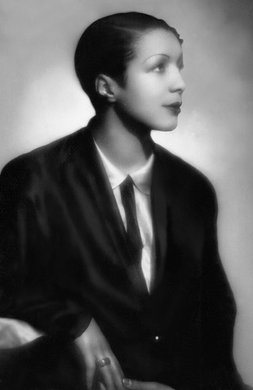
Photograph of Evelyn Dove, © The Stephen Bourne Collection – Mary Evans Picture Library
Records featured in this article
-
- From our collection
- BT 26/423/33
- Title
- Passenger list for the SS Zungeru showing Evelyn Dove, her mother and brother
- Date
- 23 September 1910
-
- From our collection
- RG 14/238
- Title
- Evelyn Dove’s 1911 Census record
- Date
- 1911
-
- From our collection
- RG 15
- Title
- Evelyn Dove’s 1921 Census record
- Date
- 19 June 1921
-
- From our collection
- RG 101/309F
- Title
- Evelyn Dove's entry in the 1939 Register
- Date
- 29 September 1939
